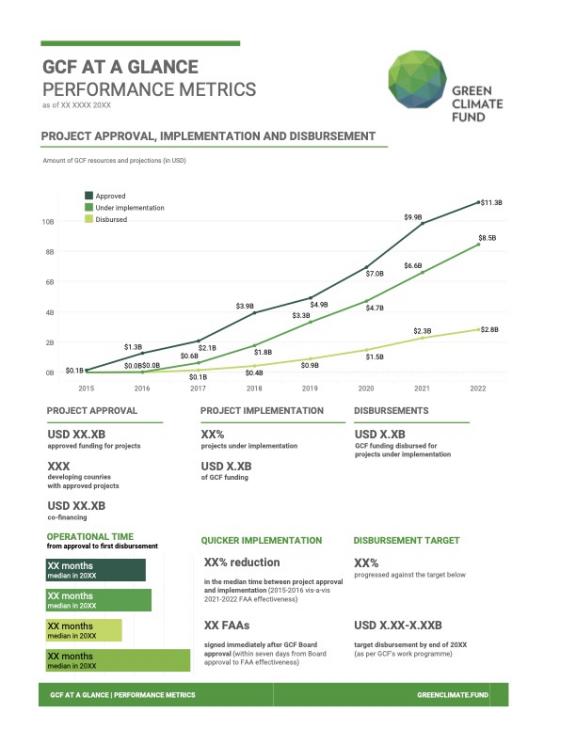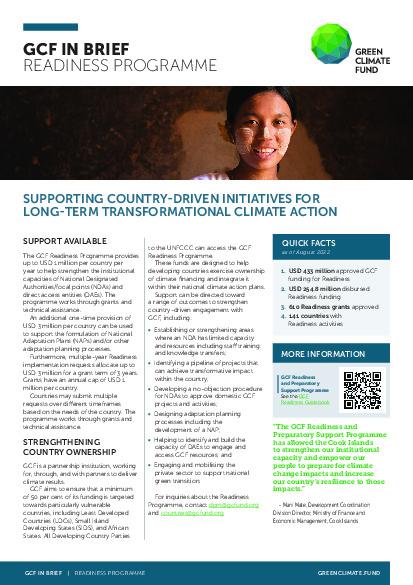Data & resources
Publications
The Green Climate Fund issues a range of publications for our direct and indirect stakeholders on a diversity of issues – for the general public to industry experts. Stay in tune with our mission and activities around the planet with the issues that speak to you.
Featured publications
Annual Report 2023
2023 was a pivotal year for the Green Climate Fund (GCF), which saw several milestones: the culmination of its 2020-2023 programming period with a maturing portfolio of USD 13.5 billion invested in 243 projects across 129 developing countries; a
Read moreDebt for climate swaps: exploring avenues and opportunities
The intersection of escalating public debt and the deepening climate crisis presents a dual challenge of paramount significance, particularly in Lower-Income Developing Countries and Small Island Developing States.
Read moreGCF at a glance: Performance metrics
This publication provides a detailed breakdown of performance metrics that show GCF’s operational progress as we seek to deliver climate finance more quickly and with greater impact.
Read moreGCF: Catalysing finance for climate solutions
The window to address the climate crisis is rapidly shrinking. Floods, droughts, heatwaves, extreme storms, and wildfires are breaking records with alarming frequency around the world.
Read moreGCF at a glance
This publication is a useful reference of GCF's portfolio, providing an overview of GCF's projects and programmes, geographic distribution, and breakdowns of GCF funding.
Read more
SAP Technical Guidelines: Agriculture and food security
February 2023
This publication provides technical guidance for the preparation of SAP proposals. The agriculture thematic area encompasses agricultural production, land-use change caused by agricultural production and the food system in general. Agricultural production covers crop production and livestock. In addition to agricultural production the food system includes all steps from “farm to fork”: post-harvest handling, storage, manufacturing, processing, transport, retailing, consumption and food loss and...

Sectoral guides' summaries
December 2022
This document provides a summary of the ten GCF sectoral guides. Each guide covers one of the sectors in which GCF operates in detail, outlining the global context for that sector, two to four paradigm shifting pathways that have potential for greatest impact, information on how these pathways can be financed, examples of cases that illustrate the potential in the sector, and the GCF investment criteria. The summaries focus on the paradigm shifting pathways and the role of GCF in financing...

Simplified Approval Process (SAP) funding proposal preparation guidelines: A practical manual for the preparation of SAP proposals
December 2022
These guidelines have been developed to support GCF accredited entities (AEs) in the preparation of funding proposals under the simplified approval process (SAP) pilot scheme. This document provides general clarifications on the indicative content expected in a SAP funding proposal submitted to GCF. More specific SAP Technical Guidelines on the type of activities by sector have also been developed separately by the Secretariat. This document refers to policies approved by the GCF Board in...

Egypt’s climate investment plan: From climate strategy to investment plan
November 2022
The Green Climate Fund (GCF) and the Government of Egypt (GoE) announces the launch of the Egypt Climate Investment Plan at COP27. The plan will be developed in two volumes covering investment needs and ambition (Volume 1) and how the GoE, GCF, and other climate financiers can systematically match different financial resources, maximising the sources of funding available (Volume 2). This brochure provides an overview of the background to, and role of the investment plan, and highlights some of...

GCF in Brief: Adaptation Planning
November 2022
The Green Climate Fund is committed to investing in developing countries’ efforts to adapt to the effects of climate change. GCF aims to deliver a 50:50 balance between mitigation and adaptation allocations in its portfolio, and ensure that at least 50% of adaptation funding goes to particularly vulnerable countries, including LDCs, SIDS and African States. This factsheet provides an overview of how GCF supports adaptation planning in the countries where it operates.

Sectoral guide: Energy efficiency
September 2022
On a global scale, energy efficiency (EE) addresses critical issues in the production, transformation, delivery, and consumption of energy – and associated materials and resources - across all economic sectors, societal groups, income levels and geographies. It is an essential approach for mitigating climate change by reducing energy-related CO2 emissions as well as reducing and offsetting energy demand growth. Above all, there is an immediate need to consolidate and mainstream an effective,...

Sectoral guide: Climate information & early warning systems
September 2022
Between 1970 and 2019, 79% of disasters worldwide were caused by weather, water, and climate-related hazards. These disasters accounted for 56% of deaths and 75% of reported economic losses associated with natural hazard events. The situation is particularly acute in Small Island Developing States (SIDS) and Least Developed Countries (LDCs). The intensity and frequency of climate-related disasters are projected to increase as climate change gathers pace, thus presenting a significant risk to...

Sectoral guide: Health & wellbeing
September 2022
There are multiple threats to health and wellbeing from climate change. At 1-1.5°C of warming above preindustrial temperatures, rising temperatures increase the frequency and intensity of extreme events; and exacerbate malnutrition, vector-, food-, and water-borne infections, zoonotic diseases, and occupational and mental health consequences. Climate change also can jeopardize critical infrastructure (e.g., water and sanitation infrastructure); and destabilize systems that maintain population...

Sectoral guide: Low emission transport
August 2022
The Transport sector has a significant and measurable impact on climate change accounting for nearly a quarter of all energy-related CO2 emissions as indicated by the International Energy Agency. Among the different modes of transport, road vehicles – freight, cars, trucks, buses, and two- and three-wheelers – account for nearly threequarters of transport carbon dioxide emissions. In addition to greenhouse gas emissions, the transportation sector is one of the major contributors to emissions of...

Sectoral guide: Water security
August 2022
Climate change is evident around the globe, and it requires bold actions now to achieve the Sustainable Development Goals (SDGs) and Paris Agreement. In addition, water is one of the world’s most essential commodities and demand for water service has increased tremendously following population growth, economic development and changing consuming patterns. Facing increasing demand for this scarce resource, the global water business seems to offer investment opportunities. There is a building...

GCF Appraisal Guidance: A comprehensive guide to the tools and due diligence processes used to review and assess concept notes and funding proposals
June 2022
The GCF Appraisal Guidance sets out the due diligence processes that are employed in the preparation of Concept Notes and Funding Proposals for presentation to the GCF Board. The Guidance document, together with associated annexes, presents the tools and materials that are available for use by the GCF Secretariat and Accredited Entities, to facilitate the delivery of proposals aligned with GCF’s mandate, policies and Investment Framework. The Appraisal Guidance supplements the GCF Programming...

Thematic brief: Investing in Great Green Wall countries
June 2022
The Sahel region is particularly vulnerable to climate change. Temperatures rising 1.5 times faster than the rest of the world are causing more intense droughts and floods consequently threatening the agropastoral livelihoods of most of the population. In 2007, the African Union launched the Great Green Wall (GGW) initiative to restore 100 million hectares of the continent's degraded landscapes, combat desertification, and help people in the Sahel mitigate and adapt to climate change. More...

GCF in Brief: Simplified Approval Process
May 2022
The Green Climate Fund is moving quickly to build a large and transformative project portfolio, with many projects already under implementation. To simplify and streamline the approval of certain small scale projects, GCF’s Board has approved a new approach: the Simplified Approval Process (SAP). The simplifications in this new approach should lead to a reduction in time and effort required to go from project conception to implementation.
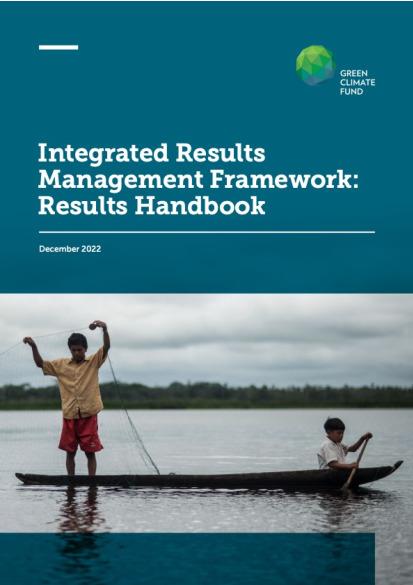
Draft results handbook
May 2022
Targeting accredited entities and executing entities as its primary audiences, the GCF’s results handbook aims to provide practical guidance on how to apply the IRMF for GCF-funded projects/programmes through funding proposal development, planning, monitoring, and reporting activities, as well as interim and final evaluations. The handbook defines each IRMF indicator and its measurement approaches with tools and reporting formats where applicable. As per the Board decision on the IRMF (...

Sectoral guide: Energy access and power generation
May 2022
The energy sector is one of the largest contributors to greenhouse gas emissions due to the world’s reliance on fossil fuels (around two thirds of global emissions are from the energy sector). At the same time, hundreds of millions of people still lack access to electricity, and a third of the world’s population lack access to clean energy sources for cooking. To limit global temperature increases to 1.5°C as well as meet the sustainable development goals, the energy sector must undergo a...

Annual Results Report 2021
April 2022
Annual Results Report 2021: Promoting low emission, climate-resilient recovery and maintaining climate ambitions during the pandemic. GCF's annual report, available in both web and pdf versions, provides an overview of our achievements during 2021. The year 2021 continued to be a period of uncertainty and upheaval for the world, but it was also a year wherein the Green Climate Fund (GCF) made huge strides in supporting low emission, climate-resilient development pathways. Nearly USD 3 billion...

GCF handbook: Decisions, policies and frameworks (updated March 2022)
March 2022
The purpose of the “GCF Handbook” is to make it easier for users to more easily navigate the GCF’s decisions and policies. To facilitate this, each primary Board decision and related policy framework has been given a descriptive title, and placed within one of ten issue oriented chapters. There, the decisions and related frameworks have been further divided by sub-issue with the most recent action on any topic listed first. The decisions and related frameworks that are particularly policy rich...
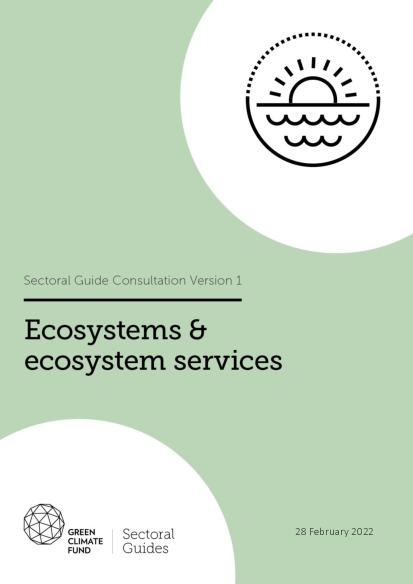
Sectoral guide: Ecosystems and ecosystem services
February 2022
The GCF recognizes the importance of the climate-nature nexus; and has given nature a high profile by including ecosystems and ecosystem services as one of the eight results areas of the fund, and by approving more than 1 billion dollars in projects and programmes related to conserving, restoring and sustainably managing ecosystems to enhance the adaptation and mitigation impact potential. Ecosystems play key roles in our efforts to address climate change and they are essential for climate-...
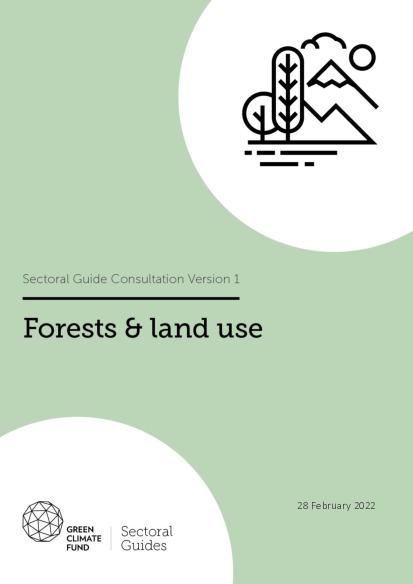
Sectoral guide: Forests and land use
February 2022
This sectoral guide provides guidance for forests and land use (FLU). As such, it is complementary to other sectoral guides, including the Sectoral Guide on Ecosystems and Ecosystem Services and the Sectoral Guide on Agriculture. Forest protection, conservation, and sustainable land management are central components of the Paris Agreement. Limiting global warming levels to 1.5°C above pre-industrial levels is not possible without protecting, restoring, and sustainably managing forests and land...


